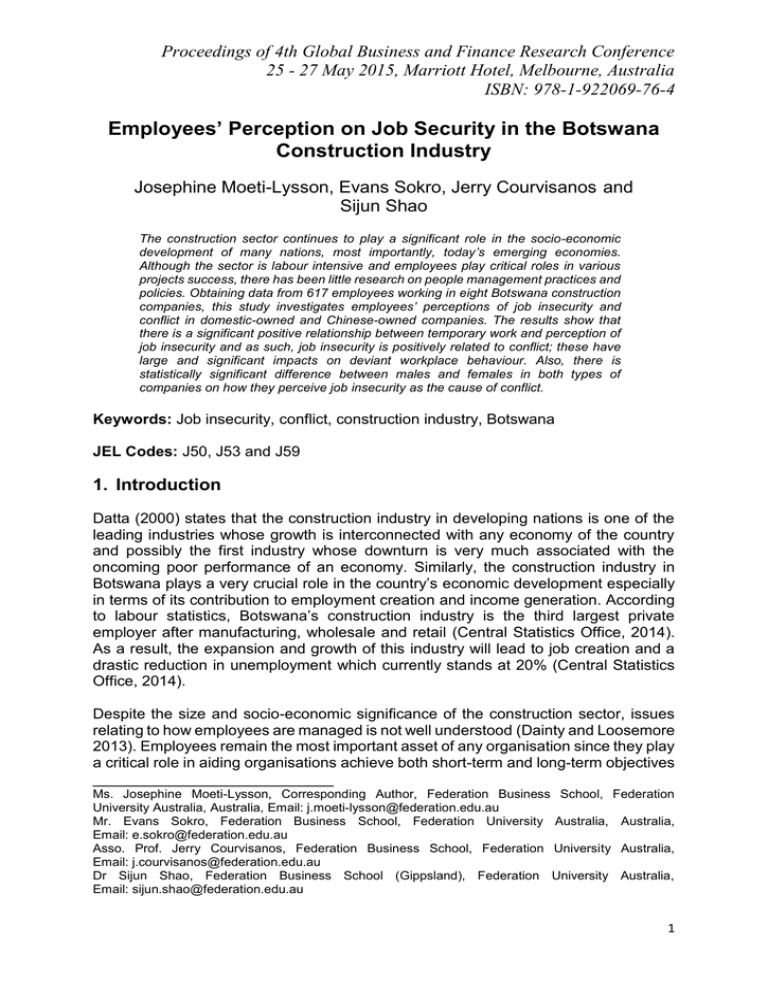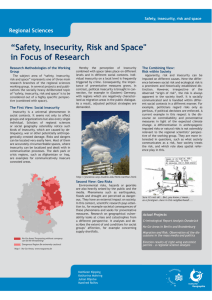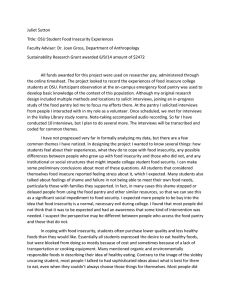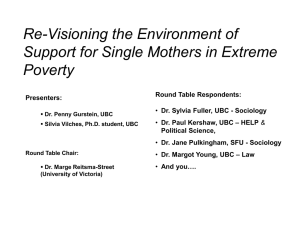Proceedings of 4th Global Business and Finance Research Conference
advertisement

Proceedings of 4th Global Business and Finance Research Conference 25 - 27 May 2015, Marriott Hotel, Melbourne, Australia ISBN: 978-1-922069-76-4 Employees’ Perception on Job Security in the Botswana Construction Industry Josephine Moeti-Lysson, Evans Sokro, Jerry Courvisanos and Sijun Shao The construction sector continues to play a significant role in the socio-economic development of many nations, most importantly, today’s emerging economies. Although the sector is labour intensive and employees play critical roles in various projects success, there has been little research on people management practices and policies. Obtaining data from 617 employees working in eight Botswana construction companies, this study investigates employees’ perceptions of job insecurity and conflict in domestic-owned and Chinese-owned companies. The results show that there is a significant positive relationship between temporary work and perception of job insecurity and as such, job insecurity is positively related to conflict; these have large and significant impacts on deviant workplace behaviour. Also, there is statistically significant difference between males and females in both types of companies on how they perceive job insecurity as the cause of conflict. Keywords: Job insecurity, conflict, construction industry, Botswana JEL Codes: J50, J53 and J59 1. Introduction Datta (2000) states that the construction industry in developing nations is one of the leading industries whose growth is interconnected with any economy of the country and possibly the first industry whose downturn is very much associated with the oncoming poor performance of an economy. Similarly, the construction industry in Botswana plays a very crucial role in the country’s economic development especially in terms of its contribution to employment creation and income generation. According to labour statistics, Botswana’s construction industry is the third largest private employer after manufacturing, wholesale and retail (Central Statistics Office, 2014). As a result, the expansion and growth of this industry will lead to job creation and a drastic reduction in unemployment which currently stands at 20% (Central Statistics Office, 2014). Despite the size and socio-economic significance of the construction sector, issues relating to how employees are managed is not well understood (Dainty and Loosemore 2013). Employees remain the most important asset of any organisation since they play a critical role in aiding organisations achieve both short-term and long-term objectives ____________________________ Ms. Josephine Moeti-Lysson, Corresponding Author, Federation Business School, Federation University Australia, Australia, Email: j.moeti-lysson@federation.edu.au Mr. Evans Sokro, Federation Business School, Federation University Australia, Australia, Email: e.sokro@federation.edu.au Asso. Prof. Jerry Courvisanos, Federation Business School, Federation University Australia, Email: j.courvisanos@federation.edu.au Dr Sijun Shao, Federation Business School (Gippsland), Federation University Australia, Email: sijun.shao@federation.edu.au 1 Proceedings of 4th Global Business and Finance Research Conference 25 - 27 May 2015, Marriott Hotel, Melbourne, Australia ISBN: 978-1-922069-76-4 and compete favourably in today’s competitive business environment. Consequently, the kinds of HRM practices and policies that are implemented have direct impact on employees’ experiences of work and the employment relationship (Winstanley and Woodal 2000; Guest 2002). However, despite the importance of the construction industry to Botswana economy, it is startling that little research on people management exists in this industry. Undeniably, a greater focus on the management of people in the construction sector would assist the industry players to effectively manage its employees in order to enhance employee satisfaction which could result in completion of project timely. This paper seeks to explore employees’ perceptions of job insecurity as a cause of conflict in the construction sector. The issue of job insecurity in the construction sector is grounded in the complex nature of project-based contracts and the fact that the tenure of employment of majority of employees depend to a large extent on availability and the duration of projects. Temporary workers who are directly engaged by organisations for a limited time period often perceive their employment as insecure due to lack of prospects of job continuity (Kalleberg 2003; McGovern, Smeaton, and Hill 2004; Bernhard-Oettel et al. 2013). 1.1 Concept of Job Insecurity Researchers seems to agree that job insecurity can be described as a subjective perception of direct threat to the future of one’s job (Sverke et al. 2002; De Bustillo and De Pedraza 2010). Greenhalgh and Rosenblatt (1984) note that job insecurity takes place when there is involuntary loss, these authors defined job insecurity as “perceived powerlessness to maintain desired continuity in a threatened job situation” (p. 438). Indeed job insecurity reflects an individual’s perception in relation to the stability and continuity of his/her employment with an organisation (Probst et al. 2003). Studies have found perceived job insecurity to be positively related with job dissatisfaction, lower organisational commitment and performance, increase psychosomatic complaints and reduced life satisfaction (Sverke et al. 2002; Cheng and Chan 2008). Scholars also argue that job insecurity has negative effect on employee behavioural outcomes including in-role behaviour, organisational citizenship behaviour, turnover intention, and absenteeism (Davy et al. 1997; King 2000; Staufenbiel and König 2010). In particular, Reisel et al. (2010) studied the effects of job insecurity on job satisfaction, organisational citizenship behaviour, deviant behaviour, and negative emotions of employees and found that job insecurity is negatively related to satisfaction and as such it has both direct and indirect effects on work behaviours and emotions. In relation to temporary workers, De Cuper et al. (2005) contend that there is significant relationship between temporary work and perceptions of job insecurity and that the majority of temporary workers report high value of job insecurity. Other studies also find positive correlation between job insecurity and longer work hours, under-reporting of accident, and higher levels of productivity (Fischer et al. 2005; Probst 2006; Probst et al. 2007). From which ever angle it is viewed, job insecurity is threatening to employees because it is the anticipation of an unplanned negative job change (Reisel et al. 2010). 2 Proceedings of 4th Global Business and Finance Research Conference 25 - 27 May 2015, Marriott Hotel, Melbourne, Australia ISBN: 978-1-922069-76-4 2. Methods This study primarily applies mixed methods to explore employees’ perception in relation to job insecurity and conflict in Botswana construction industry. In this research, survey questionnaire approach was adopted with a large sample to provide a broad overview of employees’ perceptions of job insecurity as the cause of conflict in their respective organisations. Since the research seeks to capture deep understanding on how employees perceive job insecurity, the in-depth interviews help provide such quality information by interacting with the employees (Creswell et al. 2003). Data was collected from eight companies, but due to confidentiality there are only referred to as domestic-owned and Chinese-owned companies. A total of 800 questionnaires were distributed. Of these, 690 questionnaires were returned while 617 questionnaires were found to be usable as all questions had been answered, hence a response rate of 77%. Among the 617 employees, 397 (64.3%) were male. Furthermore, in this male category 213 (53.7%) worked in domestic-owned companies, 184 (46.3 %) worked in Chinese-owned companies. The sample was made up of 220 (35.7%) females, 131 (59.5%) worked in domestic-owned companies while 89 (40.5%) worked in Chinese-owned companies. As to the employment status in domestic-owned companies; 115 (32%) were permanent, 141 (42%) on contract, and 88 (26%) temporary. In Chinese-owned companies, no employees were permanent, 133 on contract (48%) and 140 (52%) temporary. To further understand the quantitative results, interviews were conducted with 15 employees from both types of companies (seven from domestic-owned and eight from Chinese-owned). 3. Findings and Discussions Independent sample t-test was conducted to assess whether there are any statistical significant differences between domestic-owned and Chinese-owned companies on employees’ perception about job security as one of the causes of conflict in the workplace. To assess whether there is a link regarding company ownership and gender demographic characteristics as to how they perceive income distribution as the main cause of conflict, all responses to statements on job security were analysed using independent T-test as shown in Table 1. Based on ownership, there are statistically significant differences between domestic-owned and Chinese-owned companies. Also, based on gender, the results indicate that there are statistically significant differences between males and females in both types of companies on how they perceive job security as the cause of conflict. 3 Proceedings of 4th Global Business and Finance Research Conference 25 - 27 May 2015, Marriott Hotel, Melbourne, Australia ISBN: 978-1-922069-76-4 Table 1: T-test results; Job security statements and demographic characteristics Job security statements Demographic Characteristic Lack of job security is the main cause of dispute Mean Sex Ownership 4.04 3.92 3.82 4.22 T 1.135 -4.498* My job is quite secure Due to low job security, few complaints from employees Employee can be fired anytime Mean Mean Mean T 2.54 2.66 2.63 2.53 -1.160 .953 3.77 3.54 3.49 3.93 T 2.254* -4.626* 3.84 3.75 3.53 4.16 T There is no employment contract Mean .935 6.728* 2.94 2.54 2.82 2.77 T 3.770* .490 Note: (*) Means there is significance; p < .05 Table 2: Responses on Job security statements in both companies Lack of job security is the main 3.82 33 37 13 15 2 4.22 55 28 5 8 cause of dispute 2.63 9 20 18 31 22 2.53 8 17 20 32 My job is quite secure Due to low job security, there 3.49 23 37 14 19 7 3.93 38 33 15 11 are few complaints from employees’ Employees can be fired at any 3.53 29 27 17 22 5 4.16 47 33 12 6 time There is no employment 2.82 15 19 15 38 13 2.77 16 12 14 48 contract signed Respondents were asked to rate the statement on a Likert scale of 5 (agree) to 1 (strongly disagree) The results in Table 2 demonstrate that 69% of respondents in domestic-owned companies and 82% in Chinese-owned companies are of the view that lack of job security is the cause of conflict. This finding provides support to the notion that foreignowned companies offer less secure employment because they can more easily shift production across locations and this result in employees losing their jobs (Dill and Jirjahn, 2014). In the current study employees in Chinese-owned companies perceive higher percentage of job insecurity than employees in domestic-owned companies. In addition, 60% of employees in domestic-owned companies and 70% of employees from Chinese-owned companies indicate that due to low job security, there are few employee complaints to their employers. Also, 57% of employees in domestic-owned companies and 81% of employees from Chinese-owned companies perceived that they could be fired at any time, hence this can lead to conflict. Although there are statistically significant differences on job security as the cause of conflict on the above statements, the respondents from both Chinese-owned and domestic-owned companies perceived no differences based on ownership on certain statements. Specifically, on the following statements; 2 (my job is not secure) and 5 (there are no employment contract signed), employees in both types of companies shared similar sentiments. The results of this study provide evidence that there are statistically 4 Strongly Disagree Disagree Neutral Agree Strongly agree Mean Chinese-owned Strongly Disagree Disagree Neutral Agree Strongly agree Mean Domestic-owned 4 23 3 2 10 Proceedings of 4th Global Business and Finance Research Conference 25 - 27 May 2015, Marriott Hotel, Melbourne, Australia ISBN: 978-1-922069-76-4 significant differences in the forms of conflict that employees in domestic-owned and Chinese-owned companies engage in as a response to causes of conflict. From the interviews, an appreciation of the motivations behind the statistics above can be discerned. For example, R1 who works in a Chinese-owned company noted in relation to the level of job security: …the atmosphere is very tight. There is no freedom anymore. Now you are afraid that someone will see you if you take a five minute break and will tell the manager that you don’t work. They continuously keep their eyes on you, hoping you’ll make a mistake so they can get rid of you. (R1) Also, R2 who has worked for a Chinese-owned company, but now works for a domestic-owned company expressed the following views: I have no choice. If I complain, and if my job is in jeopardy, I have nowhere to go. So I am forced to be quiet and not to complain. I have no one to talk to about these issues, because if I can go talk to someone at the labour offices, I’d only make my situation worse. (R2) The above quotes are examples of sentiments shared by most employees in both types of ownership. Employees believe that the procedures in their companies were unfair, and as such their work behaviours are overly scrutinised. As a result, they were more resentful and more likely to behave aggressively towards their supervisors. The results also reveal that those employees who fear job loss at unexpected times may find themselves taking shorter breaks, stay longer and volunteering for extra work. All these actions are attempts to show dedication and thus increase their profile so that they may not lose their job. Previous research indicates that the perception of having a job, but not knowing whether it is secure, has been classified as one of the more stressful burdens that an employee can shoulder (Aquino and Douglas 2003; Probst 2010; Reisel et al. 2010). Job insecurity then means employees are bound to react or respond to this situation hence leading to more conflict. The statistical findings on employment status demographic indicate that most of the employees who work on temporary basis, in both companies constitute a higher proportion of respondents who maintain that lack of job security is the main cause of conflict. Notably, the means are significantly different between domestic-owned and Chinese-owned companies; 4.19 and 4.24 respectively. On the statement due to ‘low job security, there are few complaints from employees’, the means are significantly different between domestic-owned and Chinese-owned companies; 3.72 and 3.94 respectively. On the statement “employees can be fired at any time” means are significantly different between domestic-owned and Chinese-owned companies; 3.69 and 4.28 respectively. It can be observed that the respondents who mostly agree with the above statements on job security are more prevalent in the temporary group as compared to those on permanent and contract employment. The quotes below were expressed by two employees that reflect the increased tension suffered by temporary employees due to their lack of job security. The first view by R3 was expressed by an employee in a domestic-owned company, while the second by R2 was previously a temporary employee in a Chinese-owned company, but at the time of the interview R2 was employed as a temporary in a domestic-owned company: 5 Proceedings of 4th Global Business and Finance Research Conference 25 - 27 May 2015, Marriott Hotel, Melbourne, Australia ISBN: 978-1-922069-76-4 Temporary employees don't have any assurance of job security, although our employer can generally fire anyone at any time with reasons or no reasons, those of us who were employed as temporary workers are at risk. We can be discharged at any time especially if the company does not have any contract. (R3) Those in domestic-owned companies who disagree that lack of job security is the main cause of dispute could be those who were employed as permanent / contract staff. They could be the most experienced and highly skilled labour force. Signing and agreeing on long term or permanent contracts of employment gives an employee some piece of mind about future planning, housing or personal loans. This is so because employees feel they have a source of permanent income. But if you are just like me no bank or micro lenders will listen to you, I hear the interest rate is even higher than my salary [stated with a very serious face]. (R2) Given the responses from respondents on the above quotes indicate that employment status has an impact on how employees perceived job security as one of the main causes of disputes (or more generally ‘conflict’). R2 who worked previously in Chineseowned company is of the view that if one is employed on temporary basis, there is no assurance that tomorrow they will still be employed, and this is also due to the nature of construction industry which depends on availability of work or projects that need to be done. Additionally, R3 who works in a domestic-owned company maintains that if one has a more stable job he/she will be able to plan for the future. It will also become easy for them to access credit facilities from financial institutions because the banks will know that they will be able to get their money back, hence it makes sense to see few of those on contract and permanent status agreeing that lack of job security is the main cause of disputes. Based on the interviewees’ perceptions the results demonstrate that employees from both types of companies do agree that those employed on temporary status are more prone to job insecurity hence the results shows that perceived higher job insecurity raised the potential level of conflict. The findings of this study indicate that employees from Chinese-owned companies are of the view that due to lack of job security, employees tend to tolerate a lot from the employers, for fear of being dismissed from work and this is supported by other studies in a similar context (Fajana 2008; Iyanda 1999). In the present study, it is evident that there is a positive relationship between employment status and job insecurity and this is consistent with Wang et al. (2014). For example, in Chineseowned companies, the results indicate that there is significant relationship between temporary work and perception of job insecurity. The results indicate that 72% of temporary workers report high incidents of job insecurity and this is consistent with Bernhard-Oettel et al. (2011), De Cuper et al. (2005) and Kraimer et al. (2005). In the context of this study, Botswana has an unemployment rate of 20%, which has become particularly problematic for employees, placing pressure on them to work harder and for longer hours, in response to their feelings of uncertainty about their future. This study finding is consistent with International Labour Organisations (ILO) (2001) and Probst and Brubaker (2001) research, which found that due to a high unemployment rate in most developing countries, construction employees stay on the job because there are few or no alternatives. This finding is consistent with previous research conducted in construction settings (ILO 2001; Olomolaiye and Ogunlana 1988) suggesting that the perceived threats to job loss have deleterious effects on 6 Proceedings of 4th Global Business and Finance Research Conference 25 - 27 May 2015, Marriott Hotel, Melbourne, Australia ISBN: 978-1-922069-76-4 employees. Therefore, the findings of this study in Botswana confirm the assertion that workers are forced to endure poor industrial relations, poor working conditions, high job insecurity, long working hours and low wages. R2 who worked in Chinese-owned company argues that it is only during compliance of health and safety audit visits by government officials that employees are provided with protective gear. Although in both types of ownership employees perceive and share the same sentiments above, it appears that Chinese-owned companies more often than not have poor working conditions and do not provide employees with protective clothing and the few that do provide the protective clothing do deduct the money from employees’ wages. Similarly in a study conducted in Zambia, Li (2010) found that non-ferrous mining companies in Africa, and in particular Chinese-owned companies at large, have an adverse reputation regarding labour and environmental practices, and the neglect of corporate social responsibility. For example, the 2005 Beijing General Research Institute of Mining and Metallurgy noted that an explosion in a Chinese-owned copper mine killed almost 50 Zambian workers and fuelled much negative reputation for Chinese companies (Li 2010). This same study also notes that Swiss, British, South African and Canadian companies are said to have better labour and environmental standards. In the present study, the results indicate that most of the respondents work long hours not because they are explicitly told to do so but because they implicitly expected to, and the repercussions for not doing so threatens their livelihoods. This concurs with the findings of Baah and Jauch (2009), Guliwe (2009), and Olomolaiye and Ogunlana (1988). Baah and Jauch (2009) find that in most cases, workers felt that they had no choice but to work long hours of overtime, even without any extra pay. For instance, in Zimbabwe and Ghana, most workers in Chinese companies reported that they are forced to work overtime and long hours (around 9 -12 hours per day) for seven days per week; and this in contravention of the national labour laws. Workers know that a refusal to work such long hours would lead to automatic dismissal. 4. Conclusion and Future research One of the limitations of this study is that the sample were drawn from domestic-owned and Chinese-owned companies only companies in Gaborone, Francistown and Palapye were considered. Therefore, future research can be conducted to address this limitations for instance other companies ownership such as South African, joint ventures and those that operate in other locations could be considered. A consensus can only be reached by accumulating evidence from a more representative sample of the whole population, therefore the current study offer a base for future research. The findings of this study on job insecurity are augmented by a number of other factors such as the external economic and social environment. The effects of global financial crises and high unemployment rates also influence the work environment, e.g. employees are of the view that since the unemployment rate is high then there are limited options for getting jobs, hence employees stay in current jobs regardless of the unfairness perceived. Based on the findings in this paper, employees are of the view that often than not, they are left with the choice of quitting their jobs or going to the courts. However, quitting is viewed as a difficult choice since there are very few jobs in the industry hence certain 7 Proceedings of 4th Global Business and Finance Research Conference 25 - 27 May 2015, Marriott Hotel, Melbourne, Australia ISBN: 978-1-922069-76-4 employees end up staying in the same jobs just to make ends meets. Secondly, because of low job security employees usually find it difficult to report cases of abuse by the employers, as it has been observed that employers usually terminate the employment of those employees who take them to court. Thus, the option of justice is viewed to be too costly by the majority of the employees. This raises the issue of alternative forms of ‘justice’ which is reflected in labour conflict that emerges in various covert forms such as absenteeism, sabotage and theft/pilfering (Edwards and Scullion 1982). The research project based on the data collected from the Botswana construction industry aims to address this issue in a future paper. References Aquino, K. and Douglas, S., 2003. Identity threat and antisocial behaviour in organisations: The moderating effects of individual differences, aggressive modeling, and hierarchical status. Organisational Behaviour and Human Decision Processes, 90(1), pp. 195-208. Baah, A. and Jauch, H., 2009. Chinese investments in Africa: A labour perspective. s.l.: African Labour Research Network. Bernhard-Oettel, C., De Cuyper, N., Schreurs, B. and De Witte, H., 2011. Linking job insecurity to well-being and organisational attitudes in Belgian workers: The role of security expectations and fairness.. The International Journal of Human Resource Management, 22(9), pp. 1866-1886. Bernhard-Oettel, C., Rigotti, T., Clinton, M. and de Jong, J., 2013. Job insecurity and well-being in the temporary workforce: testing volition and contract expectations as boundary conditions. European Journal of Work and Organisational Psychology, 22(2), pp. 203-217. Cheng, G.L. and Chan, K.S., 2008. Who suffers more from job-insecurity? a metaanalytic review. Applied Psychology, 57(2), pp. 272-303. Creswell, J., Plano Clark, V., Gutmann, M. and Hanson, W., 2003. Advanced mixed methods research designs. In: Handbook of mixed methods in social and behavioural research. Thousand Oaks, CA: Sage, pp. 209-240. Central Statistics Office, 2014. Labour statistics. [Online] [Accessed 20 April 2015. Dainty, A. and Loosemore, M., 2013. Human resource management in construction: A critical perspective. s.l.:Routledge. Datta, M., 2000. Challenges facing the construction industry in developing countries.. Gaborone, Botswana, s.n., pp. 1-10. Davy, J., Kinicky, A. and Scheck, C., 1997. A test of job security's direct and mediated effects on withdrawal cognitions. Journal of Organisational Behaviour, 18(4), pp. 323-349. De Bustillo, R. and De Pedraza, P., 2010. Determinants of job insecurity in five European countries. European Journal of Industrial Relations, 16(1), pp. 5-20. De Cuper, N., Isaksson, K. and De Witte, H., 2005. Employment contracts and wellbeing among European workers. Andover, UK: Ashgate Publishing. Dill, V. and Jirjahn, U., 2014. Foreign owners and perceived job insecurity in Germany: Evidence from linked employer-employee data, No 9/14, s.l.: Research papers in economics. 8 Proceedings of 4th Global Business and Finance Research Conference 25 - 27 May 2015, Marriott Hotel, Melbourne, Australia ISBN: 978-1-922069-76-4 Edwards, P. K. and Scullion, H., 1982. The social organization of industrial conflict: control and resistance in the workplace. Great Britain: T. J. Press. Fajana, S., 2008. The Nigerian informal economy instigating decent work and pay, and national development through unionisation. Employee Relations,30(4), pp. 372-390. Fischer, F. et al., 2005. Job control, job demands, social support at work and health among adolescent workers. Revista de Saúde Pública, 39(2), pp. 245-253. Greenhalgh, L. and Rosenblatt, Z., 1984. Job insecurity: toward conceptual clarity. Academy of Management Review, 9(3), pp. 438-448. Guest, D., 2002. Human resource management, corporate performance and employee wellbeing: building the worker into HRM. Journal of Industrial Relations, 44(3), pp. 335-358. Guliwe, T., 2009. An introduction to Chinese-African relations. In: Chinese investments in Africa: A labour perspective. s.l.:African Labour Research Network.. International Labour Organisation., 2001. Tripartite meeting on the construction industry in the Twenty-first Century: Its image, employment prospects and skill requirements. [Online] Available at: http://www.ilo.org/public/libdoc/ilo/2001/101B09_246_engl.pdf. [Accessed 25 November 2012]. Iyanda, O., 1999. The impact of Multinational Enterprises on employment, training and regional development in Namibia and Zimbabwe: A preliminary assessment. [Online] Available at: http://ilo.org/wcmsp5/groups/public/---ed_emp/---emp_ent/--multi/documents/publication/wcms_117505.pdf. [Accessed 30 May 2013]. Kalleberg, A., 2003. Flexible firms and labour market segmentation. Work and Occupations, 30(2), pp. 154-175. King, J., 2000. White-collar reactions to job insecurity and the role of the psychological contract: implications for human resource management. Human Resource Management, 39(1), pp. 79-91. Kraimer, M., Wayne, S., Liden, R. and Sparrowe, R., 2005. The role of job security in understanding the relationship between employees' perceptions of temporary workers and employees' performance. Journal of Applied Psychology, 90(2), pp. 389-398. Li, P., 2010. The myth and reality of Chinese Investors: A case study of Chinese Investment in Zambia's Copper Industry, Johannesburg: South African Institute of International Affairs.. McGovern, P., Smeaton, D. and Hill, S., 2004. Bad jobs in Britain. Work and Occupations, 31(2), pp. 225-249. Olomolaiye, P. and Ogunlana, S., 1988. A survey of construction operative motivation on selected sites in Nigeria. Building and Environment, 23(3), pp. 179-185. Probst, T., 2003. Development and validation of the job security index and the job security satisfaction scale: a classical test theory and IRT approach. Journal of Occupational and Organisational Psychology, 76(4), pp. 451-467. Probst, T., 2006. Job insecurity and accident under-reporting. Dallas, TX, April 2006, s.n. 9 Proceedings of 4th Global Business and Finance Research Conference 25 - 27 May 2015, Marriott Hotel, Melbourne, Australia ISBN: 978-1-922069-76-4 Probst, T. and Brubaker, T., 2001. The Effects of job insecurity on employee safety outcomes: cross-sectional and longitudinal explorations. Journal of Occupational Health Psychology, 6(2), p. 139–159.. Probst, T. E. J., 2010. An exploratory study of the costs of job insecurity in Nigeria. International Studies of Managementand Organisation, 40(1), p. 92–104.. Probst, T., Stewart, S., Gruys, M. and Tierney, B., 2007. Productivity, counterproductivity, and creativity: the ups and downs of job insecurity. Journal of Occupational and Organisational Psychology, 80(3), pp. 479-497. Reisel, W. et al., 2010. The effects of job insecurity on job satisfaction, organisational citizenship behaviour, deviant behavior, and negative emotions of employees. International Studies of Management and Organisation,, 40(1), pp. 74-91. Reisel, W. et al., 2010. The effects of job insecurity on job satisfaction, organisational citizenship behaviour, deviant behaviour, and negative emotion of employees. International Studies of Management and Organisation, 40(1), pp. 74-91. Staufenbiel, T. and König, C., 2010. A model for the effects of job insecurity on performance, turnover intention, and absenteeism. Journal of Occupational and Organisational Psychology, 83(1), pp. 101-117. Sverke, M., Hellgren, J. and Näswall, K., 2002. No security: a meta-analysis and review of job insecurity and its consequences. Journal of Occupational Health Psychology, 7(3), pp. 242-265. Wang, H. et al., 2014. Linking procedural justice with employees work outcomes in China: The mediating role of job security. Social Indicators Research, pp. 1-12. Winstanley, D. and Woodal, D., 2000. The ethical dimmension of human resource management. Human Resource Management Journal, 10(2), pp. 5-20. 10







